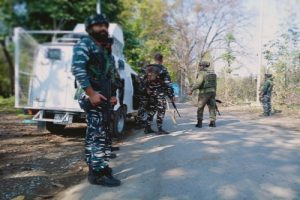The Covid-19 threat and the resulting lockdown have come at a time when in a large part of the country the rabi or winter crop is about to be harvested. This crop includes wheat as well as important pulses, oilseeds and other crops crucial for food and nutrition security in the country. All harvests are invaluable but this time the harvest will be more important because our country and the entire world are passing through an unprecedented crisis.
We need to ensure that there is no food shortage, nutrition schemes are well-stocked, the public distribution system functions smoothly (fulfilling also additional responsibilities) and farmers get proper price for their crop without much delay. Firstly, we need to ensure that the crop is harvested properly. In some parts of the country mechanised harvesting takes place, using combined harvesting machines.
In others, harvesting is still mostly done manually, using family labour as well as hired labour. In some places, there is a mix of manual and mechanised harvesting. This time the dependence on manual work is likely to be higher as harvesting machines and their operators often come from far away areas and due to various disruptions and border sealings their movements may not be normal.
During the harvesting season, a senior agricultural official in every district should be given the responsibility of coordinating the harvesting work as there are additional needs, precautions and responsibilities this year. Requirements for social distancing to the extent possible must be made known to all farmers and workers.
After getting medical advice, practical solutions should be found for this keeping in view local conditions. Water and soap should be provided at the harvesting and threshing sites. The government should not wait for this crop to be carried to the mandi. Instead it should buy a portion of the harvested cereals, millets, pulses, potatoes and oilseeds etc. for the local public distribution network and all nutrition programmes in such a way that needs of the next two months are adequately met.
In fact, the government should make an advance payment based on fair and legal price to farmers for this even before harvesting on the condition that timely and fair wages are paid to harvesting workers. This will ensure that needs of all sections including farmers and workers can be met at the same time.
As farmers will immediately get a fair sale price for a part of their crop, they will not be under compulsion to rush to mandis or cities for sale and hence the need for social distancing will be met. Public distribution rations should be distributed as per the new norms announced by the government in the lockout relief package announced on March 26, which includes provision for increased rations and a significant portion to be given free.
It should be emphasised that this should be made available without the necessity of biometrics matching as due to this, many hard-working people are denied rations. Those whose ration needs have been cancelled arbitrarily in recent times or unit members have been reduced unjustly should get full rations as per the actual number of family members.
In effect the aim is to ensure that all needy households get full rations as per the norms prevailing earlier plus the special additions made in the lockout relief package (Pradhan Mantri Garib Kalyan Package). Even if a needy family does not have a ration card it should get the ration and the newly announced free allocation.
For some time, due to requirements of social distancing, including closure of schools and anganwadis, it may not be possible to serve mid-day meals at schools, or provide the nutritious food given under schemes like ICDS and Sabla. As long as this condition exists, equivalent amounts of cereals, millets, pulses, potatoes and oilseeds should be provided to beneficiary households by adding this to their rations or separately, depending on what is convenient.
Above all, this plan will have to be implemented with strong community involvement and support. As it involves and benefits all sections including farmers, sharecroppers, farm workers, migrant workers etc. it should be possible to unite the entire community for success. Mobilisation and involvement of women will be very important.
Due to the wide availability of mobile phones and even smartphones now in villages, it should be possible to maintain social distancing during this process. It is of course very important to keep away corruption from such a people-centric plan and the mobilization of rural communities will also contribute to this.
Administrations at higher levels should also be alert about this. The government should also realize that such a plan will reduce many of its difficulties such as transportation of essential food items across long distances and the rush to purchase produce at mandis. Hence the government should seriously consider and implement such a plan.
(The writer is a freelance journalist who has been closely involved with several social movements)












